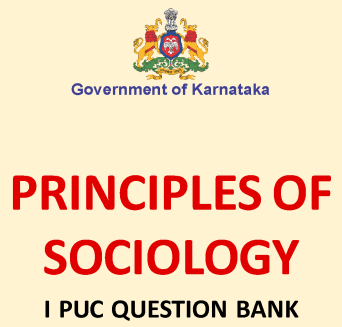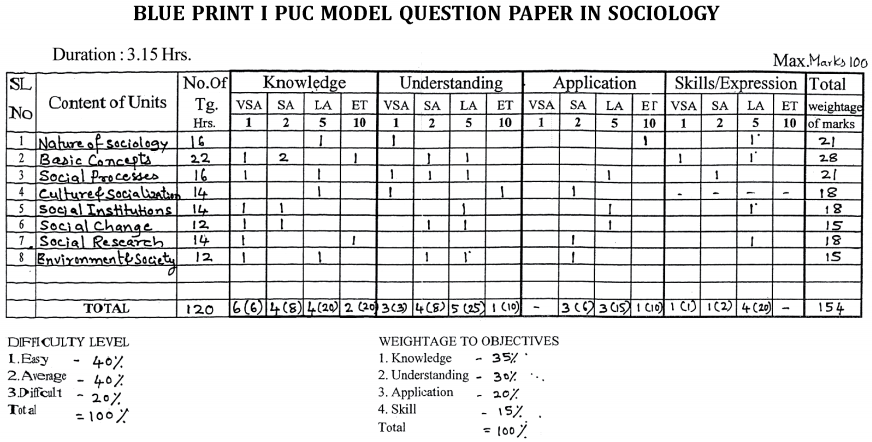Chapterwise 1st PUC Sociology textbook solutions karnataka Board are given here in PDF format for understanding the concepts involved in the syllabus. If you are looking for Chapter-wise KSEEB Solutions for 1st PUC Sociology Question Bank with Answers Solutions, Notes, Guide Pdf are given in Chapter wise format then this is the right page for you. Students are advised to download chapter wise 1st PUC Question Bank with Answers Karnataka solutions pdf to take their preparation to the next level. Go through this page and get all chapters pdf links of KSEEB solutions for 1st PUC Sociology textbook solutions pdf & learn efficiently to score high marks.
Students can also read 1st PUC Sociology Model Question Papers with Answers hope will definitely help for your board exams.
Karnataka 1st PUC Sociology Question Bank with Answers
By taking the help of the best resources like Karnataka State Board Solutions for 1st PUC Sociology Textbook Questions and Answers you all can easily understand the concepts involved in the latest KTBS Solutions are given in syllabus and gain more subject knowledge. Study 1st PUC Sociology Question Bank with Answers Karnataka solutions on a daily basis and be confident to answer all the questions asked in the final exam. Chapter-wise KSEEB solutions for 1st PUC Sociology PDF links are available below to download.

Karnataka 1st PUC Sociology Question Bank with Answers in English
- Chapter 1 Nature of Sociology
- Chapter 2 Basic Concepts
- Chapter 3 Social Process
- Chapter 4 Culture and Socialization
- Chapter 5 Social Institutions
- Chapter 6 Social Change
- Chapter 7 Social Research
- Chapter 8 Environment and Society
Karnataka 1st PUC Sociology Question Bank with Answers in Kannada
- Chapter 1 Nature of Sociology
- Chapter 2 Basic Concepts
- Chapter 3 Social Process
- Chapter 4 Culture and Socialization
- Chapter 5 Social Institutions
- Chapter 6 Social Change
- Chapter 7 Social Research
- Chapter 8 Environment and Society
Karnataka 1st PUC Sociology Blue Print of Model Question Paper

Karnataka 1st PUC Sociology Syllabus
Chapter 1 Nature of Sociology (Teaching 26 Hours, 18 Marks)
- 1.1 Meaning, Definition, Characteristics and types.
- 1.2 Meaning, Definition, Elements and types.
- 1.3 Meaning, Definition and characteristics.
- 1.4 Meaning, Definition and Characteristics.
- 1.5 Importance of studying Sociology
- 1.6 Contributions of Western and Indian sociologists to the development of Sociology.
(a) Auguste Comte (b) Herbert Spencer (c) Emile Durkheim (d) Karl Mark (e) Dr. G.S. Ghurye (f) Dr. A. R. Desai
Chapter 2 Basic Concepts (Teaching 20 Hours, 24 Marks)
- 2.1 Basic concepts: Meaning
- 2.2 Society: Meaning, Definition, Characteristics and types
- 2.3 Community: Meaning, definition, Elements and types.
- 2.5 Institution: Meaning, definition and characteristics.
- 2.6 Association: Meaning, definition and characteristics.
- 2.7 Social Groups: Meaning, definition, characteristics and classification of social groups. (Primary – secondary, unorganized – organized groups).
- 2.8 Social Control: Meaning and definition, nature, Purpose and types. (Folkways, Mores and Laws)
Chapter 3 Social Process (Teaching 16 Hours, 18 Marks)
- 3.1 Social Process: Meaning, Definition and types.
- 3.2 Co-operation: Meaning, Definition, Characteristics, Types and Importance.
- 3.4 Conflict: Meaning, Definition, Characteristics and Types.
- 3.5 Accommodation: Meaning, Definition, Characteristics, Methods and Importance.
- 3.6 Assimilation: Meaning, Definition, Characteristics and Importance.
Chapter 4 Culture and Socialization (Teaching 16 Hours, 18 Marks)
- 4.1 Culture: Meaning, Definition and Characteristics.
- 4.2 Types of Culture: Material and Non-material Culture.
- 4.3 Socialization: Meaning and Definition.
- 4.4 Stages of Socialization: Oral, anal, oedipal, adolescence and adulthood.
- 4.5 Agencies of Socialization: (Family, peer groups, schools, mass media and state)
- 4.6 The Role of culture in socialization.
Chapter 5 Social Institutions (Teaching 14 Hours, 16 Marks)
- 5.1 Marriage: Meaning and definition, characteristics, functions and types. Monogamy, polygamy, (with examples).
- 5.2 Family: Meaning and Definition, Characteristics, primary and secondary functions of family, Types (nuclear and joint family)
- 5.3 Education: Meaning and Definition, Characteristics and importance.
- 5.4 Education: Meaning and definition, Characteristics functions and types.
Chapter 6 Social Change (Teaching Hours: 12, 13 Marks)
- 6.1 Social change: meaning, definition and characteristics of social change.
- 6.2 (a) Evolution (b) Progress (c) Development
- 6.3 Factors for social change
- 6.3.1 Natural factors or geographical factor.
- 6.3.2 Biological factors
- 6.3.3 Cultural factors
- 6.3.4 Technological factors.
- 6.4 Resistance to social change.
- 6.5 Consequences of social change.
Chapter 7 Social Research (Teaching 12 Hours, 13 Marks)
- 7.1 Social Research: Meaning, Definition
- 7.2 Sources of Data
- 7.3 Tools and techniques of data collection
- 7.3.1 Observation: Meaning and Types
- 7.3.2 Interview: Meaning and Types
- 7.3.3 Questionnaire: Meaning and Types
- 7.3.4 Report writing
- 7.5 Importance of Social Research
Chapter 8 Environment and Study (Teaching 12 Hours, 13 Marks)
- 8.1 Society and Environment: Meaning and definition
- 8.2 Environmental pollution: Meaning types and factors.
- 8.2.1 Air pollution: Meaning and causes
- 8.2.2 Water pollution: Meaning and causes
- 8.2.3 Noise pollution: Meaning and causes
- 8.2.4 Soil pollution: Meaning and causes
- 8.2.5 Sources of pollution
- 8.2.6 Nuclear Radioactive pollution
- 8.2.7 Thermal pollution
- 8.2.8 Pollution by pesticides
- 8.2.9 Pollution from the solid waste
- 8.2.10 Sea pollution
- 8.2.11 Some environmental issues:
a. Global warming
b. Destruction of the ozone layer
c. Acid rain
d. Greenhouse effect
- 8.3 Bio-diversity
- 8.4 Environmental protection: Procedures and responsibility of society
We believe that the shared knowledge about Karnataka State Board solutions for 1st PUC Sociology Question Bank with Answers benefits you a lot in your exam preparation. If you need more information on the same then stay connected with our site & get updated details on KTBS Solutions PDF for all Subjects.
